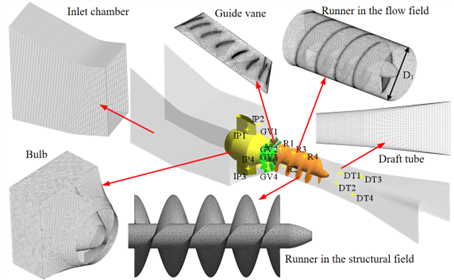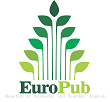Optimization of fish-friendly bulb turbine based on orthogonal method and computational fluid dynamics
DOI:
https://doi.org/10.18686/cest.v2i3.201Keywords:
tidal energy; fish-friendly bulb turbine; multi-objective optimization; hydraulic performance; structural characteristicsAbstract
A high-performance, fish-friendly bulb turbine was developed in this study by optimizing a runner with spiral blades to enhance the flow passage for fish. The key aspect of this work is multi-objective optimization based on the orthogonal method. Four factors were focused on: the number of guide vanes, the wedge angle of the blades, the distance of vaneless space, and the pitch variation ratio. The optimal value of each design parameter was determined through comprehensive measurements, including intuitive analysis, range analysis, and synthetical frequency analysis. The evaluating indexes were unit output, efficiency, fish-passing damage rate, pressure fluctuation, maximum blade deformation, and equivalent stress. The results indicate that the pitch ratio parameter significantly affected hydraulic performance, while the number of guide vanes primarily influenced fish-passing performance. The optimized turbine achieved a hydraulic efficiency of 84.05%, with a fish damage rate of only 0.01%. Structurally, the vibration modes of the runner were mainly oscillating deformation, rotating deformation around the axis, and bending deformation. The difference between the hydraulic excitation frequencies and the natural frequencies of the runner exceeded 20%, ensuring no resonance under the best efficiency point (BEP) condition. The dry and the prestressed modals showed similar natural frequencies and vibration patterns for the runner, whereas the wet modal showed higher natural frequencies for the runner.

Downloads
Published
How to Cite
Issue
Section
License
Copyright (c) 2024 Xiuli Mao, Jiahao Lu, Chuang Cheng, Zhenggui Li, Diyi Chen, Wei Han, Jiaren Hu, Tianyu Cao

This work is licensed under a Creative Commons Attribution 4.0 International License.
References
1. Yu L, Zhou Y, Zhang F. New energy power generation technology (Chinese). China Machine Press; 2018.
2. Trabelsi M, Molina S, Charpentier JF, et al. Joint coordination of optimal power management and energy storage system sizing for a full-scale marine current turbine considering microgrid integration constraint. Journal of Energy Storage. 2022; 52: 104792. doi: 10.1016/j.est.2022.104792 DOI: https://doi.org/10.1016/j.est.2022.104792
3. Shetty C, Priyam A. A review on tidal energy technologies. Materials Today: Proceedings. 2022; 56: 2774-2779. doi: 10.1016/j.matpr.2021.10.020 DOI: https://doi.org/10.1016/j.matpr.2021.10.020
4. Guo B, Ahmadian R, Falconer RA. Refined hydro-environmental modelling for tidal energy generation: West Somerset Lagoon case study. Renewable Energy. 2021; 179: 2104-2123. doi: 10.1016/j.renene.2021.08.034 DOI: https://doi.org/10.1016/j.renene.2021.08.034
5. Deb M, Yang Z, Haas K, et al. Hydrokinetic tidal energy resource assessment following international electrotechnical commission guidelines. Renewable Energy. 2024; 229: 120767. doi: 10.1016/j.renene.2024.120767 DOI: https://doi.org/10.1016/j.renene.2024.120767
6. Khare V, Khare C, Nema S, et al. Tidal Energy Systems: design, optimization and control. Elsevier, 2018.
7. Damian B. Tidal Energy: The Untapped Resource. Tellwell Talent, 2023.
8. Neill SP, Haas KA, Thiébot J, et al. A review of tidal energy—Resource, feedbacks, and environmental interactions. Journal of Renewable and Sustainable Energy. 2021; 13(6). doi: 10.1063/5.0069452 DOI: https://doi.org/10.1063/5.0069452
9. Khare V, Bhuiyan MA. Tidal energy-path towards sustainable energy: A technical review. Cleaner Energy Systems. 2022; 3: 100041. doi: 10.1016/j.cles.2022.100041 DOI: https://doi.org/10.1016/j.cles.2022.100041
10. Chowdhury MS, Rahman KS, Selvanathan V, et al. Current trends and prospects of tidal energy technology. Environment, Development and Sustainability. 2020; 23(6): 8179-8194. doi: 10.1007/s10668-020-01013-4 DOI: https://doi.org/10.1007/s10668-020-01013-4
11. Lisboa AC, Vieira TL, Guedes LSM, et al. Optimal analytic dispatch for tidal energy generation. Renewable Energy. 2017; 108: 371-379. doi: 10.1016/j.renene.2017.02.058 DOI: https://doi.org/10.1016/j.renene.2017.02.058
12. Yang C, Li Q, Xu D, et al. Fish damage due to tubular turbine: Experiments and CFD simulations. Ocean Engineering. 2023; 272: 113881. doi: 10.1016/j.oceaneng.2023.113881 DOI: https://doi.org/10.1016/j.oceaneng.2023.113881
13. Zhu G, Guo Y, Feng J, et al. Analysis and reduction of the pressure and shear damage probability of fish in a Francis turbine. Renewable Energy. 2022; 199: 462-473. doi: 10.1016/j.renene.2022.08.158 DOI: https://doi.org/10.1016/j.renene.2022.08.158
14. Macias MM, Mendes RCF, Garcia-Ortiz JH, et al. Numerical study of a fish swimming in hydrokinetic turbine wake. Journal of Ocean Engineering and Science. 2024. doi: 10.1016/j.joes.2024.03.001 DOI: https://doi.org/10.1016/j.joes.2024.03.001
15. Vikström L, Leonardsson K, Leander J, et al. Validation of Francis–Kaplan Turbine Blade Strike Models for Adult and Juvenile Atlantic Salmon (Salmo Salar, L.) and Anadromous Brown Trout (Salmo Trutta, L.) Passing High Head Turbines. Sustainability. 2020; 12(16): 6384. doi: 10.3390/su12166384 DOI: https://doi.org/10.3390/su12166384
16. Koukouvinis P (Foivos), Anagnostopoulos J. State of the Art in Designing Fish-Friendly Turbines: Concepts and Performance Indicators. Energies. 2023; 16(6): 2661. doi: 10.3390/en16062661 DOI: https://doi.org/10.3390/en16062661
17. Zhu G, Li J, Feng J. Research on Casualty Characteristics of Fish in Tubular Turbine based on IB-LBM method. Journal of Physics: Conference Series. 2020; 1549(4): 042135. doi: 10.1088/1742-6596/1549/4/042135 DOI: https://doi.org/10.1088/1742-6596/1549/4/042135
18. Pan Q, Shi W, Zhang D, et al. Fish-friendly design of an axial flow pump impeller based on a blade strike model. Proceedings of the Institution of Mechanical Engineers, Part A: Journal of Power and Energy. 2019; 234(2): 173-186. doi: 10.1177/0957650919849768 DOI: https://doi.org/10.1177/0957650919849768
19. Romero-Gomez P, Colotelo A, Weissenberger S. Quantifying the Effect of Kaplan-Type Runner Blade Gaps on Fish-related Flow Conditions. IOP Conference Series: Earth and Environmental Science. 2021; 774(1): 012148. doi: 10.1088/1755-1315/774/1/012148 DOI: https://doi.org/10.1088/1755-1315/774/1/012148
20. YoosefDoost A, Lubitz W. Archimedes Screw Turbines: A Sustainable Development Solution for Green and Renewable Energy Generation—A Review of Potential and Design Procedures. Sustainability. 2020; 12(18): 7352. doi: 10.3390/su12187352 DOI: https://doi.org/10.3390/su12187352
21. Lyons M. Lab testing and modeling of Archimedes screw turbines [PhD thesis]. The University of Guelph; 2014.
22. Zhang P, Hu D, Cheng Y, et al. Fish-friendly turbine with two counter-rotating runners. Concepts and runner optimization. Journal of Hydroelectric Engineering, 2021; 40(8): 65-72. doi: 10.11660/slfdxb.20210807
23. Lu J, Mao X, Wang Y, et al. Development and numerical test of fish-friendly turbine for tidal energy. Proceedings of the CSEE. 2023; 43(16): 6340-6348. doi: 10.13334/j.0258-8013.pcsee.221024
24. Fu T, Deng ZD, Duncan JP, et al. Assessing hydraulic conditions through Francis turbines using an autonomous sensor device. Renewable Energy. 2016; 99: 1244-1252. doi: 10.1016/j.renene.2016.08.029 DOI: https://doi.org/10.1016/j.renene.2016.08.029
25. Mueller M, Knott J, Pander J, et al. Experimental comparison of fish mortality and injuries at innovative and conventional small hydropower plants. Journal of Applied Ecology. 2022; 59(9): 2360-2372. doi: 10.1111/1365-2664.14236 DOI: https://doi.org/10.1111/1365-2664.14236
26. Brown RS, Carlson TJ, Gingerich AJ, et al. Quantifying Mortal Injury of Juvenile Chinook Salmon Exposed to Simulated Hydro‐Turbine Passage. Transactions of the American Fisheries Society. 2012; 141(1): 147-157. doi: 10.1080/00028487.2011.650274 DOI: https://doi.org/10.1080/00028487.2011.650274
27. Huang Z, Cheng Y, Wu J, et al. FSI simulation of dynamics of fish passing through a tubular turbine based on the immersed boundary-lattice Boltzmann coupling scheme. Journal of Hydrodynamics. 2022; 34(1): 135-147. doi: 10.1007/s42241-022-0014-7 DOI: https://doi.org/10.1007/s42241-022-0014-7
28. Yang C, Xu D, Zhu S, et al. Analysis and research on fish damage caused by internal pressure change of tubular turbine. Journal of Hydraulic Engineering. 2021; 52(6):731-738. doi: 10.13243/j.cnki.slxb.20200691
29. Zhu L, Zhang F, Shi X, et al. A Systematic Investigation on the Damage Characteristics of Fish in Axial Flow Pumps. Processes. 2022; 10(11): 2228. doi: 10.3390/pr10112228 DOI: https://doi.org/10.3390/pr10112228
30. Koukouvinis P (Foivos), Anagnostopoulos J. Simulating Fish Motion through a Diagonal Reversible Turbine. Energies. 2023; 16(2): 810. doi: 10.3390/en16020810 DOI: https://doi.org/10.3390/en16020810
31. Richmond MC, Romero-Gomez P, Serkowski JA, et al. Comparative Study of Barotrauma Risk during Fish Passage through Kaplan Turbines. Office of Scientific and Technical Information (OSTI); 2015. doi: 10.2172/1326154 DOI: https://doi.org/10.2172/1326154
32. Mueller M, Sternecker K, Milz S, et al. Assessing turbine passage effects on internal fish injury and delayed mortality using X-ray imaging. PeerJ. 2020; 8: e9977. doi: 10.7717/peerj.9977 DOI: https://doi.org/10.7717/peerj.9977
33. Baumgartner LJ, Thorncraft G, Phonekhampheng O, et al. High fluid shear strain causes injury in silver shark: Preliminary implications for Mekong hydropower turbine design. Fisheries Management and Ecology. 2017; 24(3): 193-198. doi: 10.1111/fme.12213 DOI: https://doi.org/10.1111/fme.12213
34. Zhou J, Zhao M, Wang C, et al. Optimal Design of Diversion Piers of Lateral Intake Pumping Station Based on Orthogonal Test. Zhu Y, ed. Shock and Vibration. 2021; 2021(1). doi: 10.1155/2021/6616456 DOI: https://doi.org/10.1155/2021/6616456
35. Xu Y, Tan L, Cao S, et al. Multiparameter and multiobjective optimization design of centrifugal pump based on orthogonal method. Proceedings of the Institution of Mechanical Engineers, Part C: Journal of Mechanical Engineering Science. 2016; 231(14): 2569-2579. doi: 10.1177/0954406216640303 DOI: https://doi.org/10.1177/0954406216640303
36. Mao X, Liu Z, Li T, et al. A brief review of numerical solving methods for internal fluid of pumped storage unit. International Journal of Energy Research. 2020; 44(10): 7886-7902. doi: 10.1002/er.5474 DOI: https://doi.org/10.1002/er.5474
37. Gu J, Cai F, Müller N, et al. Two-Way Fluid–Solid Interaction Analysis for a Horizontal Axis Marine Current Turbine with LES. Water. 2019; 12(1): 98. doi: 10.3390/w12010098 DOI: https://doi.org/10.3390/w12010098
38. Xin L, Li Q, Li Z, et al. Analysis of Runner Dynamics of Reversible Hydraulic Turbine by Alternating Fluid–Solid Action. Frontiers in Energy Research. 2022; 10. doi: 10.3389/fenrg.2022.943339 DOI: https://doi.org/10.3389/fenrg.2022.943339
39. Sun J, Zhou Y, Ge X, et al. Research on Multiobjective Optimization of Bulb Tubular Turbine Based on Orthogonal Test. Zhou L, ed. Shock and Vibration. 2021; 2021(1). doi: 10.1155/2021/5581455 DOI: https://doi.org/10.1155/2021/5581455
40. Chen J, Zheng Y, Zhang L, et al. Optimization of geometric parameters of hydraulic turbine runner in turbine mode based on the orthogonal test method and CFD. Energy Reports. 2022; 8: 14476-14487. doi: 10.1016/j.egyr.2022.10.444 DOI: https://doi.org/10.1016/j.egyr.2022.10.444
41. Southern Illinois University. Chapter 8 Orthogonal Designs. Available online: http://parker.ad.siu.edu/Olive/rch8.pdf (accessed on 12 August 2024).
42. Zuo Z, Liu S, Sun Y, et al. Pressure fluctuations in the vaneless space of High-head pump-turbines—A review. Renewable and Sustainable Energy Reviews. 2015; 41: 965-974. doi: 10.1016/j.rser.2014.09.011 DOI: https://doi.org/10.1016/j.rser.2014.09.011
43. Ke C, Xiong L, Peng N, et al. Numerical and experimental study of the performance effects of varying vaneless space in high-speed micro turbine stators. Cryogenics. 2017; 88: 10-16. doi: 10.1016/j.cryogenics.2017.09.004 DOI: https://doi.org/10.1016/j.cryogenics.2017.09.004
44. Rode BR, Kumar A. Unstable pressure fluctuations in the vaneless space of high-head reversible pump-turbines – A systematic review. Journal of Energy Storage. 2023; 72: 108397. doi: 10.1016/j.est.2023.108397 DOI: https://doi.org/10.1016/j.est.2023.108397




.jpg)
.jpg)

